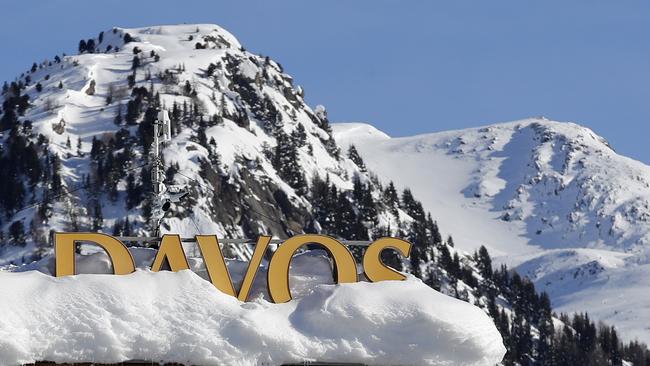Outlook from Davos is better than expected and global economic fears are melting

Kicking off the World Economic Forum in Switzerland on Monday, the outlook for the global economy from business chief economists was gloomy. Almost two-thirds of them see a likely global recession.
Yet two flagship speeches that followed, one from the German Chancellor and one from the IMF, were notably more upbeat.
Chancellor Olaf Scholz insisted that a recession in Europe’s powerhouse would not happen.
IMF deputy managing director Gita Gopinath hinted that the organisation would upgrade its global outlook, shifting from a “tougher” 2023 to expecting an “improvement” in the second half and into next year.
At Davos the skiing is pretty rubbish, with only 10 of 18 lifts working, due to the extraordinarily mild winter across Europe.
What this has done for energy prices in Europe is equally extraordinary. It underpins the Scholz optimism. In both Germany and Britain, the governments have announced that support for home energy bills will be far less than forecast, saving billions on national budgets.
And falling energy prices puts downward pressure on inflation, reducing the pressure on central banks to keep lifting rates. Last week, Goldman Sachs and Bank of America dropped expectations of a European winter recession.
In EnergyQuest’s closely watched monthly gas update, CEO Graeme Bethune notes that European spot prices are down 80 per cent from their 2022 highs due to warmer-than-expected weather, demand destruction and LNG imports. And that this has affected Asian spot prices, which are also lower on weak demand from the Chinese lockdown.
In Australia too, east coast spot prices fell by 15-28 per cent from November to December.
The vexing question is exactly how do falling global gas prices affect Australia’s economic outlook?
In the UK, lower spot gas flows remarkably quickly into lower household power bills. This has allowed the Sunak government to predict that bills will fall below the £3000 per household energy government guarantee, saving an estimated £11bn ($19.3bn) for the national coffers.
In sharp contrast, this week The Australian reports that major retailers such as AGL, Origin and EnergyAustralia will lift household gas prices by a further 20 per cent from next month. This is despite the Gas Supply Hub spot price falling to $13 a gigajoule as at January 17, with local spot markets in Sydney and Victoria at below the government’s $12-a-gigajoule wholesale price cap.
Unpacking Australian power pricing is difficult. Southern states use gas for direct heating, but gas also contributes to the electricity grid and for some of the time it drives grid pricing.
Part of the reason Australians will not see price falls any time soon is that the review of default market offers (on electricity) are annual, so there is a lag in price revisions – both on the way up and on the way down. Partly due to the northern hemisphere energy crisis, the UK has moved to quarterly price reviews, making the system far more responsive. But does this mean that falling global gas prices will not influence Australian inflation? The economy will no doubt have less tax income from the big gas producer profits on spot sales in 2022.
In a speech in November, RBA deputy governor Michele Bullock noted that the large increases in retail gas and electricity prices predicted for 2023 would directly add more than 1 per cent to headline inflation over the year to September 2023 with another 0.5 per cent over 2024 in underlying inflation as businesses increase prices in response. Has that view changed?
Inevitably given a war, a pandemic and the largest normalisation of monetary policy in history, uncertainty remains around the global outlook.
The Federal Reserve insists a recession in the US will be avoided. It wants to see further evidence of the recent cooling in inflation before it changes tack on rate rises.
At Davos, China’s end to zero-Covid was welcomed, as was the America Inflation Reduction Act, which propels investment in energy transition.
Strong consumer demand over Christmas, confirmed this week by results from JB Hi-Fi and Super Retail, should not surprise anyone with consumers continuing to dig into savings. The same is happening in Europe. Spending is expected to slow as mortgage rates peak, but global recession risk is falling.
The RBA expects Australia’s inflation to peak at 8 per cent in December, but by the time that is confirmed, it will be in the rearview mirror. The RBA’s February meeting will be closely watched.




Move over Cassandras. Global energy prices are falling and China is reopening. The year will be less painful than predicted for the world economy. In a fortnight, the Reserve Bank holds its first monthly meeting for the year. Today the market looks divided on whether another 25-basis-point rate rise will even happen. Either way, governor Philip Lowe’s fresh commentary on the changing global outlook and its impact on Australia will be important.